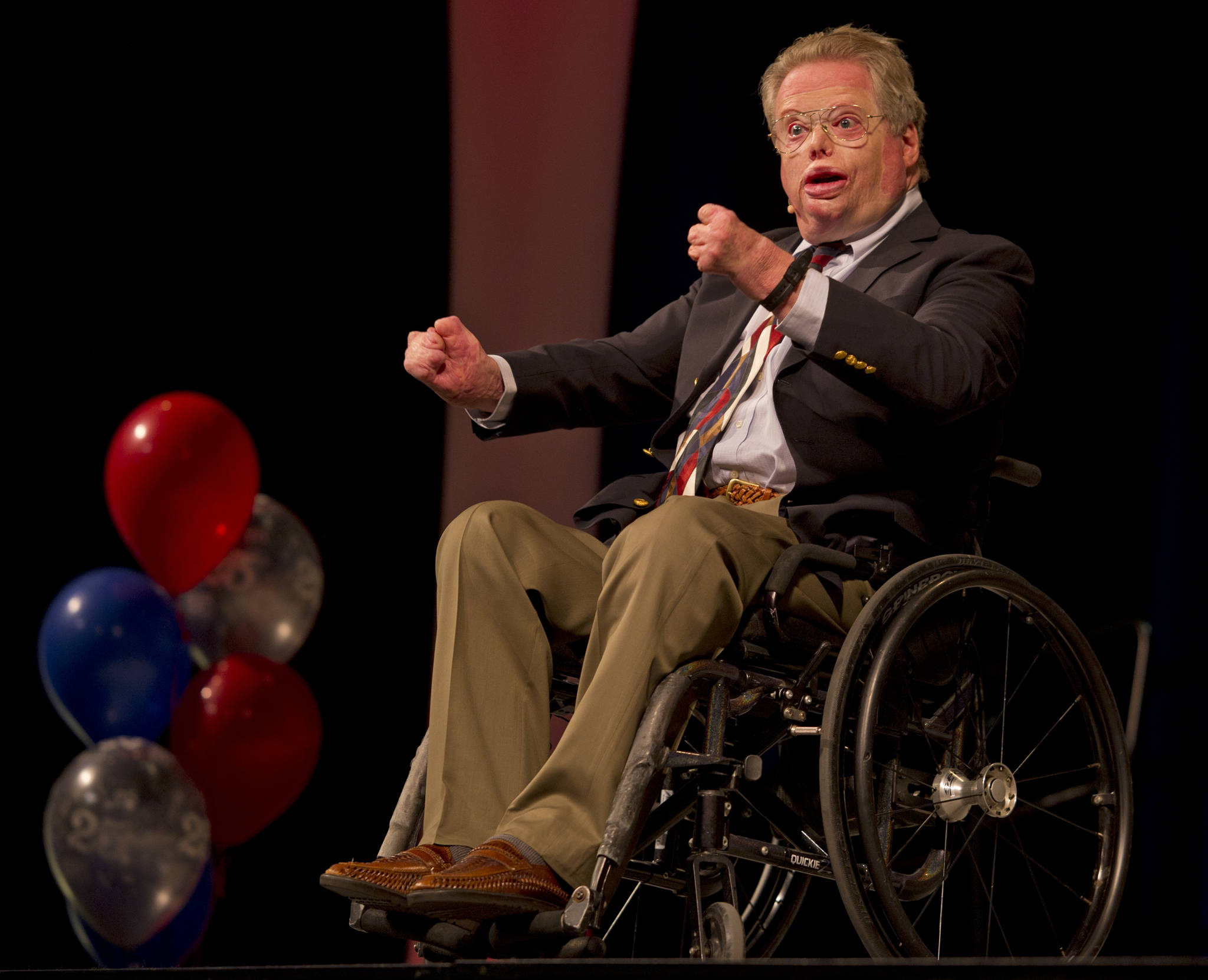Pillars of America speaker W. Mitchell’s hardships in life are written clearly over his entire body.
“Once you hear him speak, you’ll understand (why we brought him up,)” said Juneau Glacier Valley Rotary Club member and Juneau Assembly member Beth Weldon before Mitchell’s talk at Centennial Hall. He was the Pillars of America series speaker on Wednesday, brought to town by the club.
Against all odds, Mitchell still believes in “service above self,” which also happens to be the motto of the Rotary club.
In 1971, when he was in his late 20s, Mitchell was driving his motorcycle back from his first solo flight piloting a plane. On the way home, he accidentally crashed his motorcycle into a van. Though the crash was bad enough, then the gas cap to his bike came off and turned in him into “a human bonfire.”
That bonfire burned 65 percent of Mitchell’s body, took away all of his fingers on both hands, and at one point left the ex-marine thinking, “what kind of future exists for a man like me?”
After four months in the hospital and what seemed like endless days of surgeries, Mitchell was exhausted. He asked his physician if he could have “the day off.”
The doctor’s response? “I’m going to put you in charge of you.”
That was a turning point.
From there on out Mitchell chose what surgeries he’d continue having and which he wouldn’t. For the first time, he truly took what he calls “responsibility for (his own) change.”
“Response-able. Having the ability to respond is what matters,” Mitchell said.
His transition back into the world outside the hospital wasn’t easy. He found it difficult to look people in the face; he couldn’t touch anything with his bandaged hands; he had to open doors with his feet. When he walked outside, he looked only at his shoes. Then, one day, a teenage girl smiled at him. That smile changed Mitchell’s life forever.
“With that smile she said ‘You’re OK. You might look a little different, but you’re OK,” Mitchell said.
Mitchell’s own smiles went on to make an impact in others’ lives. Four years after his motorcycle crash, because of his changed outlook, life for Mitchell was better even than it had been.
Then things changed again.
In 1975, Mitchell was piloting a plane with four passengers in Crested Butte, Colorado. Immediately after takeoff, his plane stalled (later, he found out the wings had been icy) and crashed back onto the runway.
All he could think about were his fiery memories of the motorcycle crash. He yelled at his passengers to get out.
It was when he tried to get out, himself, that he realized he couldn’t move his legs. At first, he thought his feet were stuck under the pedals. Then, he felt the pain in his back. He had injured his spinal cord and had become paralyzed from the waist down.
A new world, filled with more impossibilities to overcome, again awaited Mitchell.
“What you focus on is what you’ll get back,” Mitchell said. “Dwell on the 9,000 things you can do instead of the 1,000 things you can’t.”
Two main accomplishments he’s proud of are becoming the mayor of Crested Butte and preventing nearby Mount Emmons from becoming the site of a molybdenum mine built by AMAX (now Freeport-McMoRan).
Mitchell also offered the audience perspective on the bright side to a more recent, local event.
The several hundred people listening at Centennial Hall that day weren’t there just for the lunch, but are the kind of people that “show up,” he said.
“You’re people that when playgrounds burn down you build them back up,” he said.
Mitchell’s book is called “It’s Not About What Happens to You, It’s What You Do About it.” Those were also his last words of advice to the audience.
• Mackenzie Fisher is an intern for the Capital City Weekly and can be reached at mackenzie.fisher@capweek.com.

